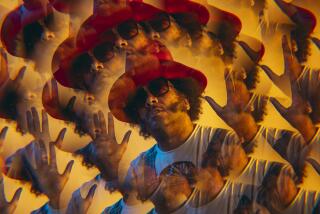Review: ‘Ray Donovan,’ Liev Schreiber make sure things work out
“Ray Donovan,” a new drama premiering Sunday on Showtime, takes the unlikely tack of overlaying a “Boston-Irish dysfunctional family with criminal elements” story — you know the type — onto a backdrop of big-shot Hollywood. And gets away with it.
Created by Ann Biderman (“Southland”), it is on paper not a show I’d expect to like. I grow weary of antiheroes. I tire of the way that TV and movies picture Hollywood just to kick it around.
Notwithstanding the creeps and hacks that doubtless can be found in its corner offices and power corridors, it’s also a place where a lot gets done by people committed to good work, who go home to more or less (factoring out the money, privilege and hired help) ordinary lives.
PHOTOS: Hollywood backlot moments
There are some obvious moves early on. Doris Day’s dreamy recording of “Hooray for Hollywood” plays as the camera copters in over the Sunset Strip to find the obligatory naked woman. (Dead, and three minutes in, already the series’ second corpse — though the rate of nakedness and death quickly declines afterward.) And there is so much expository dialogue in the opening episode that characters who are close kin seem at times to have just met.
And yet, once it finds its rhythm, it works very well — something like “The Sweet Smell of Success” crossed with “The Long Goodbye,” in terms of “dirty town” pictures, but with more family feeling. A few caricatures stick out among the characters, but the subtler conceptions, on the page and in performance, win out.
Liev Schreiber plays Ray, a calmly, sometimes brutally efficient high-end private eye and “fixer,” working out of the high-end law offices of Ezra Goldman (Elliott Gould) and Lee Drexler (Peter Jacobson). (Irish, Jewish and black characters — a trifecta of the historically marginalized — predominate.) Fit and sleek and expensively dressed, with a close haircut and a modish near-beard, he spends his life in the service of the feckless powerful (some corrupt, some just dumb). He makes bad things go away, as they say, sometimes by doing bad things himself.
PHOTOS: Celebrities by The Times
The irony is that his very own Bad Thing — in the person of his father, Mickey (Jon Voight), just out of prison and headed west — will not be got rid of easily.
Ray has two brothers he moved with him from Boston to California. Terry (Eddie Marsan) is an ex-fighter suffering from Parkinson’s, Bunchy (Dash Mihok), sexually abused as a child by his priest, is an alcoholic in a state of arrested development. Also in the mix are a dead sister and an unsuspected half-brother (Pooch Hall). Everyone is at least a little lonely.
For reasons that aren’t discussed, Ray has moved his immediate family out to the subdivided hills of Calabasas, much to the displeasure of wife Abby (Paula Malcomson). He loves them — Kerris Dorsey and Devon Bagby play his teenage kids — but he’s too often off solving other people’s problems instead of tending to his family’s slowly mounting ones. If Ray is more successful and self-controlled than Mickey, we are also meant to see him as tainted, tempted and as at least partially his father’s son — though Biderman also takes care to show him acting out of a sense of “moral responsibility” (giving him those very words to say) as well.
Schreiber, whose career has ranged from “Scream” to “Hamlet,” is excellent, as ever — it’s a fine cast all around — but the show balances on Voight’s performance. I resist superlative phrases like “never been better,” but certainly I can’t remember Voight being any finer than he is here.
There are a few moments in the first episode, during his reunion with Ray, where he seems to be doing a James Cagney imitation. (I thought it might be a homage.) This diminishes in later episodes — I’ve seen four — as do other things the pilot makes overt: the shakiness of Terry’s arm, Ezra’s guilty confusion, Ray’s dislike of being touched by strangers.
Mickey is on the one hand an eccentric senior citizen who dispenses unusual, unprintable advice (and fistfuls of cash) to his newly met grandchildren. On the other hand, he is the wolf at the gate Ray declares him to be.
What makes him vital, as Voight plays him, is that he seems to exist fully in these conflicting states, hurt that Ray is not happy to see him, even though he is, in some way, out to get him. Voight makes sure we see Mickey as a person, and essentially mysterious, and not a type, known from the start.
PHOTOS, VIDEOS & MORE:
Real places, fake characters: TV’s bars and eateries
CRITICS’ PICKS: What to watch, where to go, what to eat
PHOTOS: Violence in TV shows
More to Read
The biggest entertainment stories
Get our big stories about Hollywood, film, television, music, arts, culture and more right in your inbox as soon as they publish.
You may occasionally receive promotional content from the Los Angeles Times.











